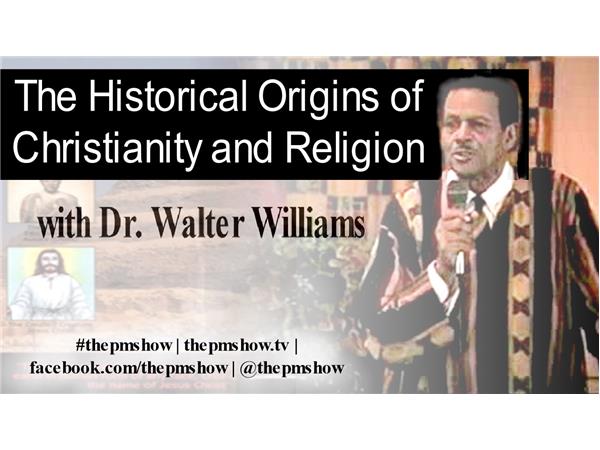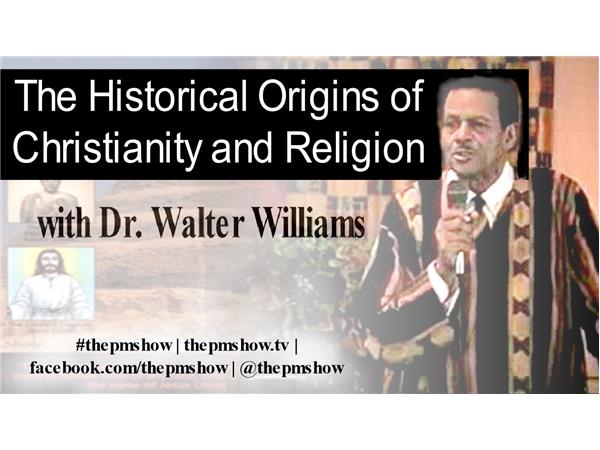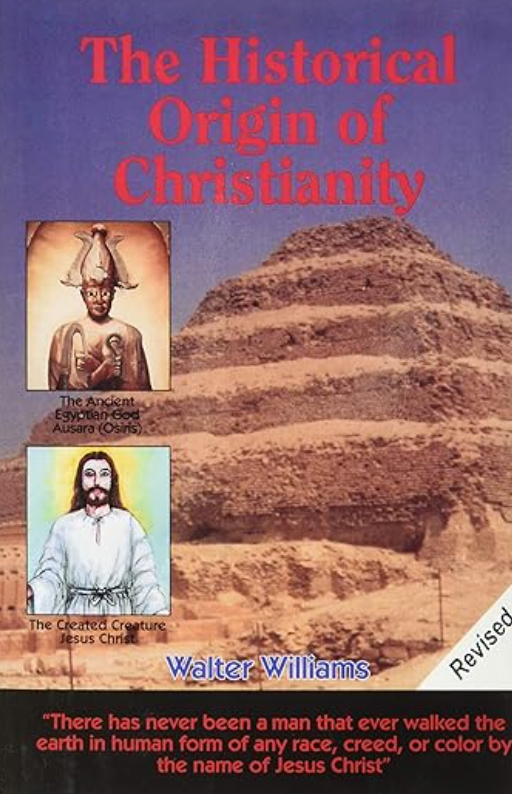
By Rev. Dr. Philippe SHOCK Matthews

Although I purchased this book in 2017 and conducted three epic interviews with Dr. Walter Williams on my radio show, in my opinion, his groundbreaking book “Historical Origins of Christianity” takes readers on a provocative journey through the annals of history, challenging long-held beliefs about the roots of one of the world’s most influential religions. With meticulous research and a deep understanding of Ancient Egyptian culture, Williams presents a compelling case for the human origins of Christianity, arguing that it is a product of the Greek and Roman invasion of Egypt rather than a divine revelation.
At the heart of Williams’ thesis is the idea of spiritual birthright – that every human being is born with a divine connection to the universal consciousness, maintained through the breath and the pineal gland. He sees religion, particularly Christianity, as a man-made construct designed to sever this connection and exert control over the masses. As Williams states, “Man-made religion was introduced to confuse the natural spiritual cosmic unity you have with the He/She Creator” (p. 100).
Williams traces the evolution of Christianity back to the Greek invasion of Egypt in 332 BCE when Alexander the Great removed the existing Pharaoh governor and put himself in his place. After Alexander’s death, Ptolemy I, Lagi, took over the rule of Egypt and sought to create a god in his own image with the help of Melchite Coptic Egyptian priests. The result was the composite deity Serapis, which Williams sees as the foundation for the later development of the Christ figure.

The author argues that the creation of Christianity was a deliberate process spanning centuries aimed at subjugating the descendants of the Ancient Egyptians and maintaining European supremacy. He points to the Council of Ephesus in 431 CE as the historical moment when Christianity truly began, with the transformation of the Ancient Egyptian divine triad of Osiris, Horus, and Isis into the Christian trinity of the Father, Son, and Holy Ghost.
Williams’ work is a scathing indictment of the role of religion in justifying slavery, segregation, and discrimination against people of African descent. He sees the erasure of Ancient Egypt’s influence on Western religion as a deliberate attempt to maintain European supremacy, stating, “The European religious academic communities have erased the Coptic Egyptian origin of Christianity thereby creating a total European (i.e., racist) worldview of Christianity” (p. 103).
While Williams’ arguments are grounded in historical evidence and a deep understanding of Ancient Egyptian spirituality, some readers may see his language and characterizations of Europeans as overly broad and inflammatory. He describes the Greeks and Romans as “an agnostic, physical, psychopathic, illiterate, uncivilized European race of people” (p. 73). He argues that the belief in a European Christ figure “starts you to subconsciously act docile in the presence of Europeans, which gives them the illusion that they should think, act, and feel superior over people of African descent and other races of color” (p. 103).
Despite these limitations, “Historical Origins of Christianity” serves as an important reminder of the power of historical narrative and the importance of questioning dominant assumptions about religion, history, and social justice. As Williams notes, “If we do not question history as it is popularly written, we only learn what the writers of history want us to know” (p. 115).

For readers of African descent, Williams’ work may be especially resonant as a call to reclaim their spiritual and cultural heritage. He argues that the descendants of the Ancient Egyptians are spread throughout the world and that they have been robbed of their true identity through the imposition of false and non-ethnic names such as “negroes, blacks, and African Americans” (p. 116).
Ultimately, “Historical Origins of Christianity” invites us to embark on a spiritual and historical discovery journey, question the dominant narratives that shape our understanding of the world, and reclaim our divine birthright as children of the universe. Williams writes, “Always remember that you were born spiritually free of all man-made religions, i.e., no one was born with a religion. What happened is that man-made religion was introduced to confuse the natural spiritual cosmic unity you have with the He/She Creator” (p. 100).
While the path forward may not be easy, and the truths revealed may be uncomfortable, Williams’ work reminds us of the importance of facing history with courage, compassion, and a commitment to justice. By unveiling the past’s hidden truths, we can build a more authentic and equitable future for all.
“There has never been a man that ever walked the Earth in human form of any race, creed or color by the name of Jesus Christ.”
Dr. Walter Williams (Historical Origins of Christianity)
AFRICANA PHENOMENOLOGY BOOK REVIEW:
- Africana Phenomenology Book Review: Historical Origins of Christianity by Dr. Walter Williams https://bit.ly/3IMEH0O
- THREE PART INTERVIEW SERIES
- p1 – Dr. Walter Williams (The Historical Origins of Christianity and Religion) https://bit.ly/3Kh9g0B
- p2 – Dr. Walter Williams (How Jesus and the Virgin Mary Were Created) https://bit.ly/3YZ5fm5
- p3 – Dr. Walter Williams – (How the First Bible Was Created) https://bit.ly/3kcyGBQ
RELATED:
Baba Chester Higgins (The Missing Link)
The Consequences of Mormonism and Religion on the African / African American Mind and Body
#Christianity #God #JesusChrist #MentalSlavery #DrWalterWilliams #HistoricalOriginsofChristianity
SUPPORT OUR RESEARCH:
- Join the 1st Frequency of Oneness on Patreon! https://www.patreon.com/revshock | 1st Frequency of Oneness Research Fund https://bit.ly/42lr54b | Fly Solo with Rev. Dr. SHOCK! https://solo.to/revshock